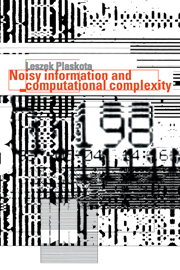6 - Asymptotic setting
Published online by Cambridge University Press: 13 January 2010
Summary
Introduction
In Chapters 2 to 5, we fixed the set of problem elements and were interested in rinding single information and algorithm which minimize an error or cost of approximation. Depending on the deterministic or stochastic assumptions on the problem elements and information noise, we studied the four different settings: worst, average, worst-average, and average-worst case settings.
In this chapter, we study the asymptotic setting in which a problem element f is fixed and we wish to analyze asymptotic behavior of algorithms. The aim is to construct a sequence of information and algorithms such that the error of successive approximations vanishes as fast as possible, as the number of observations increases to infinity.
The asymptotic setting is often studied in computational practice. We mention only the Romberg algorithm for computing integrals, and finite element methods (FEM) for solving partial differential equations with the meshsize tending to zero. When dealing with these and other numerical algorithms, we are interested in how fast they converge to the solution.
One might hope that it will be possible to construct a sequence φn(yn) of approximations such that for the element f the error ∥S(f) − φn(yn)∥ vanishes much faster than the error over the whole set of problem elements (or, equivalently, faster than the corresponding radius of information). It turns out, however, that in many cases any attempts to construct such algorithms would fail. We show this by establishing relations between the asymptotic and other settings.
- Type
- Chapter
- Information
- Noisy Information and Computational Complexity , pp. 268 - 292Publisher: Cambridge University PressPrint publication year: 1996



